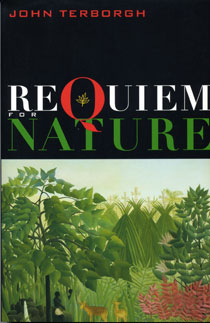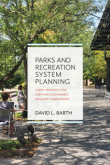For ecologist John Terborgh, Manu National Park in the rainforest of Peru is a second home; he has spent half of each of the past twenty-five years there conducting research. Like all parks, Manu is assumed to provide inviolate protection to nature. Yet even there, in one of the most remote corners of the planet, Terborgh has been witness to the relentless onslaught of civilization.
Seeing the steady destruction of irreplaceable habitat has been a startling and disturbing experience for Terborgh, one that has raised urgent questions: Is enough being done to protect nature? Are current conservation efforts succeeding? What could be done differently? What should be done differently? In Requiem for Nature, he offers brutally honest answers to those difficult questions, and appraises the prospects for the future of tropical conservation. His book is a clarion call for anyone who cares about the quality of the natural world we will leave our children.
Terborgh examines current conservation strategies and considers the shortcomings of parks and protected areas both from ecological and institutional perspectives. He explains how seemingly pristine environments can gradually degrade, and describes the difficult social context –a debilitating combination of poverty, corruption, abuses of power, political instability, and a frenzied scramble for quick riches –in which tropical conservation must take place. He considers the significant challenges facing existing parks and examines problems inherent in alternative approaches, such as ecotourism, the exploitation of nontimber forest products, "sustainable use," and "sustainable development."
Throughout, Terborgh argues that the greatest challenges of conservation are not scientific, but are social, economic, and political, and that success will require simultaneous progress on all fronts. He makes a compelling case that nature can be saved, but only if good science and strong institutions can be thoughtfully combined.
"[Terborgh's] zoological absolutism deserves respect. [Requiem for Nature] presents a cogent case."
New York Review of Books
"Bravo John Terborgh! The book not only succeeds in portraying the realities behind our efforts to save natural areas but provides a blueprint for changes in thinking and behavior that must be undertaken if we want wildlands to survive."
Natural History Magazine
"In this beautifully written, gut-wrenching, important book, John Terborgh, one of the world's greatest field biologists, takes us on a world tour of the present state and future prospects of nature. To describe his history as 'gripping' would be an understatement: you will find it difficult to take time out for dinner once you start reading. For anyone intereted in our own future, this book is a 'must-read.'"
Jared Diamond, Professor of physiology, UCLA Medical School; winner of the Pulitzer Prize for general nonfiction
"In Requiem for Nature, John Terborgh provokes us to rethink strategies for protecting the rapidly dwindling biological wealth of our planet. With his many years of scientific research in Peru's remote Manu National Park and his extensive travels to parks and protected areas around the world, he is uniquely positioned to issue this compelling wake-up call and to offer a prescription for change."
Kathryn S. Fuller, president, World Wildlife Fund
"Terborgh's Requiem for Nature is an important dispatch from the tropical conservation front by a distinguished biologist who has studied most of the forests of the world on which he reports. With compelling documentation, Terborgh reports that we—and future generations—may be winning a few battles to save the world's biodiversity but are losing the war. He argues that to circumvent the malign combination of overpopulation and political incompetence, it will be necessary to rely on the broadening public ownership of the best natural environments and a strong, morally based political will to protect that natural environment for its own sake."
Edward O. Wilson, author of "Naturalist", "In Search of Nature", and "The Future of Life"
Preface
Chapter 1. The Making of a Dissident
Chapter 2. Assessing the Present
Chapter 3. Paradise Fading
Chapter 4. The Danger Within
Chapter 5. Parks:The Last Bastions of Nature
Chapter 6. Protecting Biodiversity
Chapter 7. Preserving Biodiversity for Posterity
Chapter 8. Tropical Forests:Worth More Dead Than Alive
Chapter 9. From Wildlands to Wasteland: Land Use and the Mirage of Sustainable Development
Chapter 10. Why Conservation in the Tropics Is Failing: The Need for a New Paradigm
Chapter 11. Hard Choices in the Twenty-First Century
Chapter 12. Nature, a Global Commons
Notes
Index
















